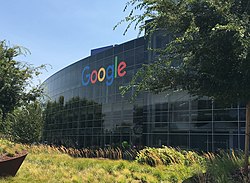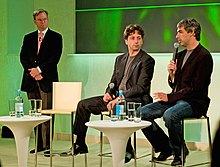
Back Google Afrikaans ጉግል Amharic Google AMI Google ANG Gugulu ANN جوجل Arabic ݣووݣل ARY جوجل ARZ গুগল Assamese Google AST
 The Google logo used since 2015 | |
 Google's headquarters, the Googleplex | |
| Formerly | Google Inc. (1998–2017) |
|---|---|
| Company type | Subsidiary |
| NASDAQ: GOOGL, GOOG | |
| Industry | |
| Founded | September 4, 1998[a] in Menlo Park, California, United States |
| Founders | |
| Headquarters | Googleplex, , U.S. |
Area served | Worldwide |
Key people |
|
| Products | |
Number of employees | 182,502 (2023) |
| Parent | Alphabet Inc. |
| Subsidiaries | |
| ASN | |
| Website | about |
| Footnotes / references [5][6][7][8] | |

Google LLC (/ˈɡuːɡəl/ ⓘ, GOO-gəl) is an American multinational corporation and technology company focusing on online advertising, search engine technology, cloud computing, computer software, quantum computing, e-commerce, consumer electronics, and artificial intelligence (AI).[9] It has been referred to as "the most powerful company in the world"[10] and is one of the world's most valuable brands due to its market dominance, data collection, and technological advantages in the field of AI.[11][12][13] Google's parent company, Alphabet Inc., is one of the five Big Tech companies, alongside Amazon, Apple, Meta, and Microsoft.
Google was founded on September 4, 1998, by American computer scientists Larry Page and Sergey Brin while they were PhD students at Stanford University in California. Together, they own about 14% of its publicly listed shares and control 56% of its stockholder voting power through super-voting stock. The company went public via an initial public offering (IPO) in 2004. In 2015, Google was reorganized as a wholly owned subsidiary of Alphabet Inc. Google is Alphabet's largest subsidiary and is a holding company for Alphabet's internet properties and interests. Sundar Pichai was appointed CEO of Google on October 24, 2015, replacing Larry Page, who became the CEO of Alphabet. On December 3, 2019, Pichai also became the CEO of Alphabet.[14]
The company has since rapidly grown to offer a multitude of products and services beyond Google Search, many of which hold dominant market positions. These products address a wide range of use cases, including email (Gmail), navigation and mapping (Waze, Maps and Earth), cloud computing (Cloud), web navigation (Chrome), video sharing (YouTube), productivity (Workspace), operating systems (Android), cloud storage (Drive), language translation (Translate), photo storage (Photos), videotelephony (Meet), smart home (Nest), smartphones (Pixel), wearable technology (Pixel Watch and Fitbit), music streaming (YouTube Music), video on demand (YouTube TV), AI (Google Assistant and Gemini), machine learning APIs (TensorFlow), AI chips (TPU), and more. Discontinued Google products include gaming (Stadia),[15] Glass, Google+, Reader, Play Music, Nexus, Hangouts, and Inbox by Gmail.[16][17] Google's other ventures outside of internet services and consumer electronics include quantum computing (Sycamore), self-driving cars (Waymo, formerly the Google Self-Driving Car Project), smart cities (Sidewalk Labs), and transformer models (Google DeepMind).[18]
Google Search and YouTube are the two most-visited websites worldwide followed by Facebook and Twitter (now known as X). Google is also the largest search engine, mapping and navigation application, email provider, office suite, online video platform, photo and cloud storage provider, mobile operating system, web browser, machine learning framework, and AI virtual assistant provider in the world as measured by market share.[19] On the list of most valuable brands, Google is ranked second by Forbes[20] and fourth by Interbrand.[21] It has received significant criticism involving issues such as privacy concerns, tax avoidance, censorship, search neutrality, antitrust and abuse of its monopoly position. On August 5, 2024, D.C. Circuit Court Judge Amit P. Mehta ruled that Google held an illegal monopoly over Internet search.[22]
- ^ Fitzpatrick, Alex (September 4, 2014). "Google Used to Be the Company That Did 'Nothing But Search'". Time. Archived from the original on October 16, 2019. Retrieved September 27, 2019.
- ^ "When is Google's birthday – and why are people confused?". The Daily Telegraph. September 27, 2019. Archived from the original on January 10, 2022.
- ^ Griffin, Andrew (September 27, 2019). "Google birthday: The one big problem with the company's celebratory doodle". The Independent. Archived from the original on January 12, 2021. Retrieved September 27, 2019.
- ^ Wray, Richard (September 5, 2008). "Happy birthday Google". The Guardian. Archived from the original on January 12, 2021. Retrieved September 27, 2019.
- ^ "Company – Google". January 16, 2015. Archived from the original on January 16, 2015. Retrieved September 13, 2018.
- ^ Claburn, Thomas (September 24, 2008). "Google Founded By Sergey Brin, Larry Page... And Hubert Chang?!?". InformationWeek. UBM plc. Archived from the original on June 28, 2011. Retrieved January 22, 2017.
- ^ "Locations – Google Jobs". Archived from the original on September 30, 2013. Retrieved September 27, 2013.
- ^ Cite error: The named reference
:0was invoked but never defined (see the help page). - ^ Condon, Stephanie (May 7, 2019). "Google I/O: From 'AI first' to AI working for everyone". ZDNet. Archived from the original on April 2, 2022. Retrieved April 2, 2022.
- ^ Jack, Simon (November 21, 2017). "Google – powerful and responsible?". BBC News. Archived from the original on March 29, 2022. Retrieved March 29, 2022.
- ^ McCormick, Rich (June 2, 2016). "Elon Musk: There's only one AI company that worries me". The Verge. Archived from the original on March 29, 2022. Retrieved March 29, 2022.
- ^ "Justice Department Sues Monopolist Google For Violating Antitrust Laws". U.S. Department of Justice. October 20, 2020. Archived from the original on January 20, 2021. Retrieved March 29, 2022.
- ^ "Land of the Giants: The Titans of Tech". CNN+. Archived from the original on April 17, 2022. Retrieved April 18, 2022.
- ^ Feiner, Lauren (December 3, 2019). "Larry Page steps down as CEO of Alphabet, Sundar Pichai to take over". CNBC. Archived from the original on August 24, 2020. Retrieved June 16, 2021.
- ^ Peters, Jay; Cranz, Alex (September 30, 2022). "Google is shutting down Stadia in January 2023 - The Verge". Archived from the original on October 10, 2024. Retrieved October 15, 2024.
- ^ Brady, Heather; Kirk, Chris (March 15, 2013). "The Google Graveyard". Slate. Archived from the original on March 16, 2013. Retrieved March 16, 2013.
- ^ Booker, Logan (March 17, 2013). "Google Graveyard Does Exist". gizmodo. Archived from the original on May 18, 2018. Retrieved May 17, 2018.
- ^ "Inside X, Google's top-secret moonshot factory". Wired UK. ISSN 1357-0978. Archived from the original on May 19, 2022. Retrieved May 17, 2022.
- ^ Hanief, Mohammad (April 7, 2023). "How Google has made our life easy". Greater Kashmir. Archived from the original on December 23, 2023. Retrieved December 23, 2023.
- ^ Swant, Marty. "The World's Valuable Brands". Forbes. Archived from the original on October 18, 2020. Retrieved January 19, 2022.
- ^ "Best Global Brands". Interbrand. Archived from the original on February 1, 2022. Retrieved March 7, 2011.
- ^ Barakat, Matthew; Liedtke, Michale (August 5, 2024). "Google illegally maintains monopoly over internet search, judge rules". Associated Press. Retrieved August 6, 2024.
Cite error: There are <ref group=lower-alpha> tags or {{efn}} templates on this page, but the references will not show without a {{reflist|group=lower-alpha}} template or {{notelist}} template (see the help page).